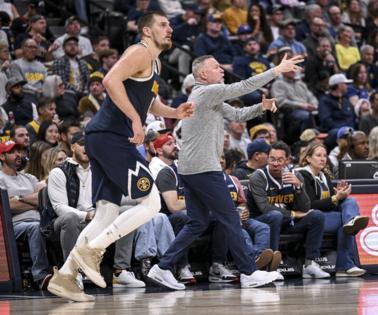Nikola Jokic has Nuggets in cruise control. Can they manage his minutes and keep winning?
Published in Basketball
DENVER — Nikola Jokic was in the Nuggets’ training room last Friday night, going through his usual postgame workout routine when his head coach paid him a visit.
Michael Malone doesn’t feel any need to apologize to Jokic for the heavy minutes — “You see his paycheck? I mean, come on, man,” the coach wisecracked — but he did want to check in on his starting center with one game remaining in Denver’s long homestand.
“I know that when we’re in the second quarter and there’s 10 minutes on the clock and I’m saying, ‘Nikola, let’s go,’ you’re looking at me like this,” Malone recalled saying two nights later, mimicking an expression of tired disbelief. ” ‘Coach, already?’ And I go, ‘Yes, already, brother.’ ”
The paycheck: $51.4 million this year, a number set to increase by more than $4 million next season.
The minutes: 38.1 per game, tied for fourth in the NBA after Jokic led the Nuggets (7-3) to a 122-120 win over Dallas.
“Thirty-eight is actually a good number,” Malone said half-jokingly as he skimmed the box score after the win. “I’m pretty happy about that. We kept him under 40.”
The three-time MVP has touched the 40-minute mark in three of Denver’s first 10 games, including the one Friday. It’s a threshold he crossed only four times the entire 2023-24 regular season. His average was 34.6.
But those 38.1 minutes are why Denver emerged from the weekend with a five-game win streak and the sixth-best record in the NBA. Jokic ranks fourth in the league in scoring at 29.7 points per game, first in rebounds at 13.7, first in assists at 11.7 and ninth in steals at 1.7. All of those numbers are career highs except the rebounding. (He once averaged 13.8.)
“I think I’m playing really good,” Jokic said. “And I hope I can continue to play like this. … Just because I’m putting up great — not great — good numbers, it’s not just me. There are a lot of people behind me.”
But the margin for error has been too razor-thin for Denver to rely on those behind him. Five of the Nuggets’ wins have been up for grabs on the last possession of regulation. Four of them have been by exactly two points. Their team net rating of 2.7 ranks 12th in the league. Their point differential is plus-98 with Jokic on the floor and minus-58 with him on the bench.
“He understands,” Malone said. “He’s a warrior. But I will say this: I don’t know how sustainable it is to play Nikola 38 to 40 minutes every night. Let’s be honest. We’re 10 games in. We’re 7-1 now in our last eight. And that is great. But we’ve also gotta find ways to continue to find some other options off of our bench.”
Dario Saric was the first option. He has been out of the rotation for the last four games after an underwhelming start as Jokic’s backup center. (“I’ve been really bad,” he told The Denver Post. “That’s how I feel.”) Aaron Gordon successfully anchored the second unit in the second halves of two tense games, but he’s missing time with a calf injury now, and that itself may be a cautionary tale about the perils of over-exertion. Next, DeAndre Jordan dropped by for half a game. And since then, it’s been Zeke Nnaji’s turn. The 23-year-old has displayed a handful of encouraging individual moments, but the results have been mostly similar for the bench as a unit.
For a snippet of the fourth quarter Friday, Malone abandoned his center rotation altogether. The search for solutions led him to Peyton Watson at the five, an act of positional improvisation that somehow worked against Miami. Malone sees Watson as a dynamic roller who can handle a smorgasbord of roles, but he wants to be selective about when he goes to that ultra-small-ball lineup in the future.
“I think it’s something that if we wanted it to be (regular), it’s something that we could go to. But when you do that, you’re really cutting down your rotation,” he said. “And obviously only nine games in, that’s probably one of my bigger concerns right now, is making sure that we’re not running guys into the ground with so much basketball left to be played.”
Malone goes into every game hoping to play Jokic in the range of 34 to 35 minutes, more or less keeping with career averages. The center is a passive bystander to his own usage, never asking for any sort of cap on his playing time. When games are close, Malone’s reflex is to turn around, scan his bench and direct Jokic to the scorer’s table.
When every game is close, it only takes him two minutes to feel MVP withdrawal.
The ideal number of minutes per game to play Jokic?
“Forty-eight,” Malone said, laughing.
That comment was two hours before Sunday’s win, a magnum opus that nobody, including Jokic himself, had ever paralleled. He became the first player in NBA history to record 37 or more points, 18 or more rebounds and 15 or more assists in a game. It was only the second time in league history that a player has gone for 35, 15 and 15 in fewer than 42 minutes. (The other player to accomplish that was also on the court, in a different uniform.)
Every bit of that stat line was necessary, down to Jokic’s game-tying offensive rebound and tip-in with 49 seconds remaining.
“I would assume that after tonight’s performance, he’ll probably be like fifth in the MVP voting early in the season,” a sarcastic Malone said afterward, “so he’s just gotta do more for us.”
Once again, he was joking. But maybe not completely.
©2024 MediaNews Group, Inc. Visit at denverpost.com. Distributed by Tribune Content Agency, LLC.







Comments